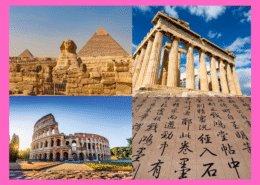Throughout history, great civilizations have risen, flourished, and left lasting marks on society. Their innovations in government, science, art, literature, architecture, and philosophy helped build the foundation of the world we live in today. From writing systems to engineering marvels, many of our modern systems can be traced back to these ancient cultures.
Below are the 10 most influential civilizations that shaped the modern world.
1. Ancient Mesopotamia – The Birthplace of Civilization
Often called the Cradle of Civilization, Mesopotamia introduced:
-
The first writing system (cuneiform)
-
The earliest legal codes
-
Advanced mathematics
-
Urbanization and organized governance
Modern writing, law, and city planning owe much to Mesopotamian innovations.
2. Ancient Egypt – Masters of Architecture and Knowledge
Egypt’s influence goes beyond pyramids. They developed:
-
One of the earliest forms of medicine
-
Hieroglyphics
-
Advanced engineering
-
Agricultural irrigation systems
Their architectural techniques and scientific thinking shaped modern engineering and medicine.
3. Ancient Greece – Foundation of Western Philosophy & Democracy
Greece transformed human thought and governance. Their contributions include:
-
Democracy
-
Philosophy (Socrates, Plato, Aristotle)
-
Theater and the arts
-
The Olympic Games
-
Scientific inquiry
Modern government, education, and arts trace their roots to Greek ideas.
4. The Roman Empire – Builders of Law, Roads & Governance
Rome built one of the most organized civilizations in history. They pioneered:
-
Modern legal systems
-
Architectural innovations (arches, aqueducts, concrete)
-
Roads and transportation
-
Republic-style governance
Today’s law, administration, and infrastructure reflect Roman influence.
5. Ancient China – Innovators That Transformed the World
China introduced countless inventions still used today:
-
Paper
-
Gunpowder
-
The compass
-
Printing
-
Silk production
-
Advanced philosophy (Confucianism, Taoism)
Their influence spans science, technology, philosophy, and trade.
6. The Indus Valley Civilization – Early Urban Planners
This South Asian civilization developed:
-
Sophisticated urban planning
-
Drainage and sanitation systems
-
Standardized weights and measures
-
Early trade networks
Their organized city layouts influenced modern architecture and urban systems.
7. Ancient Persia – Pioneers of Governance & Human Rights
The Persian Empire introduced:
-
The first human rights charter (Cyrus Cylinder)
-
Efficient postal and road systems
-
Federal-style governance
-
Religious tolerance
Persian innovations transformed global politics and cultural exchange.
8. Islamic Civilization – Golden Age of Science & Knowledge
From the 8th to 14th centuries, the Islamic world was a global center of learning. They advanced:
-
Algebra and advanced mathematics
-
Medicine and surgery
-
Astronomy
-
Architecture
-
Preservation and translation of ancient knowledge
Many scientific and medical principles used today originated or were perfected here.
9. The Mayan Civilization – Experts in Astronomy & Mathematics
The Maya developed:
-
Highly accurate calendars
-
Advanced mathematics (including the concept of zero)
-
Monumental architecture
-
Complex writing systems
Their scientific discoveries still influence astronomy and mathematics.
10. The British Empire – Spread of Modern Global Systems
Though controversial in history, the British Empire undeniably shaped the contemporary world through:
-
English as a global language
-
Modern parliamentary governance
-
Global trade systems
-
Industrialization
-
Legal and educational frameworks
Many current global institutions reflect British influence.
Conclusion
Civilizations rise and fall, but their contributions endure. From writing and mathematics to governance and engineering, the legacies of these ancient powers continue to shape our modern world in visible and invisible ways. By studying these civilizations, we understand not only our past — but also the foundation of our present.

